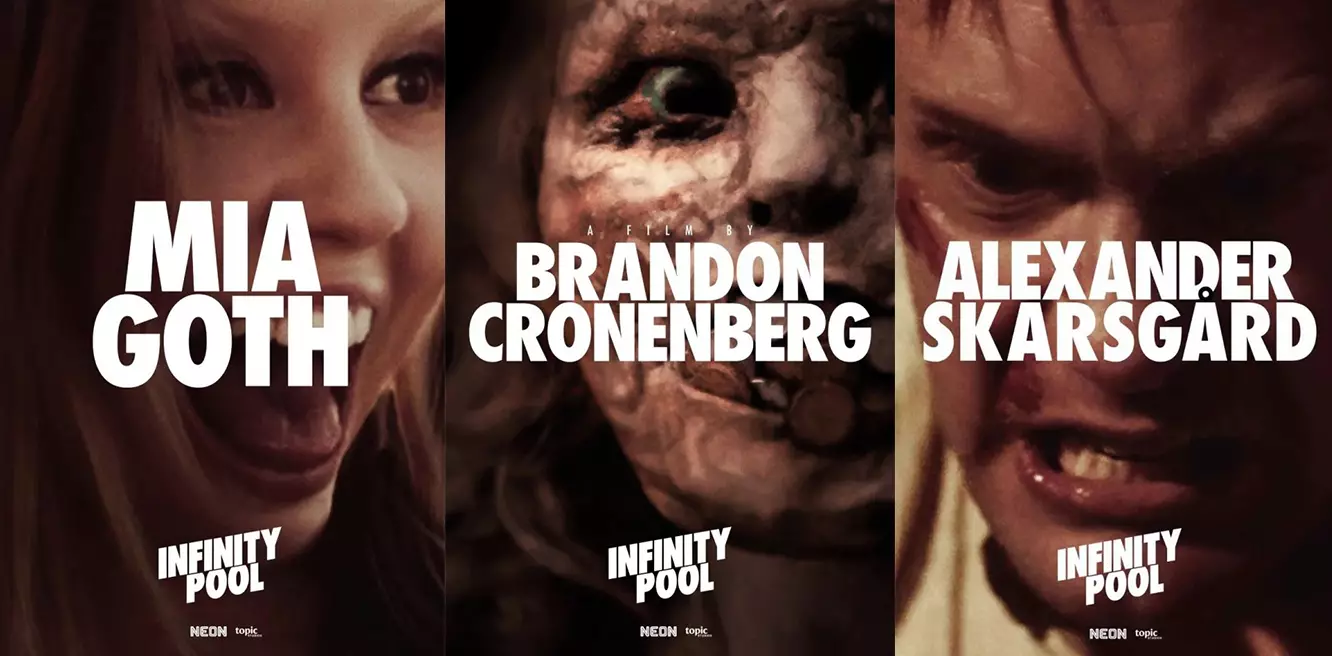
Despite having seemingly insurmountable shoes to fill, Brandon Cronenberg is proving himself to become a sophisticated auter with a deranged vision. His interest in pushing the boundaries and distortions of the human body whilst also delivering biting satire and social commentary is crystal clear in his latest release, Infinity Pool, which delights itself in displaying pure hedonism, and leaves the audience dripping with a sense of nauseating nihilism, in its tense 117-minute run-time.
Mia Goth and Alexander Skarsgård’s chemistry is unmatched as Goth plays the role of the mysterious and alluring Gabi, a resort island guest who sits snugly within the upper echelons of society. Skarsgård plays the compliant and desperate James who seeks out peace and inspiration with his wife, Em (Cleopatra Coleman).
The married couple takes a well-needed holiday to an All-Inclusive resort on the island of La Tolqa. Their disconnect is palpable from the first scene, and it’s clear that neither is able to fully communicate or enjoy the other’s company, despite being in a “paradise” that only comes from extreme wealth and privilege. It becomes apparent that James is a failing writer, unable to reach the goals and dreams of success that he’s set himself, and his affluent wife Em is starting to resent footing the bill for the both of them.

What appears to be an uninspired, unfulfilling holiday is sharply changed when James meets Gabi, seemingly by chance, at the resort. Their chemistry on screen is instantaneous, both as actors and characters. From this first encounter between the two guests, it’s clear there’s an immediate attraction, and Gabi uses this to lure James on a journey of excess, hubris, and depravity as she unveils the seedy underbelly of La Tolqa. To James, she not only reveals the monstrous side of the La Tolqan society but the monstrous side of himself. This premise is introduced in the opening of the film which includes a mind-bending camera angle, where the resort is flipped upside down, almost hinting to the audience that all is not what it seems on this holiday, the grim reality is about to be laid out bare.
After being showered in sickly sweet compliments from Gabi regarding his first novel, James convinces Em to join Gabi and Alban (Gabi’s husband) to leave the safety of the resort compound and travel out to rural La Tolqa to visit a beach. Although this is wildly prohibited by the resort staff, to the extent the resort is surrounded by a barbed wire electronic fence, they use their extreme wealth and privilege to bribe the guards and escape the resort, free to enjoy their day as they wish.

Following a strained, yet exciting day at the beach with Gabi and Alban, played by Jalil Lespert, James decides to drive them back, but this decision results in disastrous consequences and changes the trajectory of their lives forever. James and Em soon find out that Gabi’s retorts of the native islanders of La Tolqa being a “brutal, savage and uncultured people” are not altogether unfounded. Drained, disorientated, and extremely out of their depth, the two couples find themselves confined to a prison cell, being charged with murder, of which the sentence for this heinous crime is capital punishment: death.
The body and humanity soon become a commodification, something used as a bargaining chip utilised by those with extreme wealth, at the expense of the lower class. The body horror that the Cronenberg name is famous for ramps up at this point, as James finds out he can use his wife’s money to escape his punishment. For a price, he can “body double” and create a clone of himself that will be sentenced to face the consequences of his actions on his behalf. With each clone that passes in the film, James is effectively “killing” himself, both literally and metaphorically. The man he once was, insecure but moral, changes dramatically as Gabi and Alban push him to become more morally deranged and reprehensible.

The rich are simultaneously dehumanising the La Tolqan’s and themselves through their depraved escapades. Gabi’s comments about the La Tolqa islanders being “brutal and savage” echo the prejudiced sentiments of 18th-century colonisers. As the film progresses, it’s clear that the La Tolqa islanders and culture aren’t savage. The real brutality lies with the wealthy clan that James finds himself being indoctrinated by, as they use their affluence and privilege to turn an economically shattered country into their sick playground of debauchery. The vaguely depicted geographical location of the fictional island serves as a reminder that white privilege and Euro-centric ideology permeate throughout the world, and as the film unravels the mediation on the devastating effects of unchecked privilege and arrogance is fully realised. Even the traditional ceremonies and masks tied in with the cultural heritage of the island are mocked by the super-elite to facilitate their hedonism and revenge, displaying a complete disregard for the sanctity of other cultures. On the surface, the grotesque masks may appear to represent the brutal traditions, but they take on a different role when abused by the rich troupe and their thinly veiled veneer of superiority is stripped away as they ironically “mask” themselves when carrying out their sick fantasies.
Pulsating and sickening, the score of the film upholds the undercurrent of unrelenting dread the whole way through. This is paired with an almost dream-like, phantasmagorical blend of colour and camera distortions during a hallucinogenic trip. Physical boundaries are constantly crossed in the film between Gabi and James, which culminates in an erotic, psycho-sexual tripping scene. The violation of physical boundaries metamorphosise into a complete melting of any boundaries, both within morality and psyche. Mia Goth’s performance as the domineering and captivating Gabi is magnetising to both the audience and James as a character. She simultaneously builds up and erodes his sense of self; through her, he is able to combat his emasculation at the hands of his wife, at the cost of losing himself completely and succumbing to Gabi’s every whim. He is both a victim and a willing participant in his own degradation.

Brandon Cronenberg certainly serves up a plating of abhorrent body horror in Infinity Pool, but his exploration of the abhorrent side of human nature, and unchecked privilege, seems to be more his forte. The film is clearly a continuation of similar themes that were explored in his previous feature, Possessor, and is not one to miss for creating an atmosphere of disgust as to what the human body and mind are capable of.

*Affiliate Link
Infinity Pool (2023) is available to purchase here*
More Film Reviews
It is no mystery to seasoned J-horror fans that many of the most prolific directors of the genre started their careers making low-budget short films for television or straight-to-video productions,… Pareidolia is a 2023 short horror film directed by Aaron Truss, whose previous work includes the wonderful full-length documentary Cult of VHS (2022). Amazingly, this newest project was brought to… There aren’t many people who can say they have taken thirty years to complete a project. At the current rate, George R.R. Martin might be able to when he finally… In 2009, House of Wax’s Jaume Collet-Serra gave us the modest hit Orphan starring a pre-Conjuring era Vera Farmiga as a mother who, after the death of their unborn child,… Having just landed on Shudder UK, The Final Wish (2018) is director Timothy Woodward Jr’s third film and boasts a story from Jeffery Reddick, writer of the first two Final… Dubbed the most evil house in America by demonologists Ed and Lorraine Warren, 112 Ocean Avenue, Amityville, Long Island, New York has definitely piqued the curiosity of many horror fans…Crazy Scary (2023) Film Review – Honoring Kaidan Through the Lens of DIY
Pareidolia (2023) Review – A Short Film with Big Scare [FrigthFest]
Mad God (2021) Film Review – A Flawed Technical Wonder
Orphan: First Kill (2022) Film Review – There’s Still Something Wrong With Esther
The Final Wish (2018) Film Review – When You Wish Upon A Star
Shock Docs: Amityville Horror House – Paranormal Documentary Review

![Pareidolia (2023) Review – A Short Film with Big Scare [FrigthFest]](https://www.grimoireofhorror.com/wp-content/uploads/2023/08/Pareidolia-10-365x180.jpg)



